Deficiency | RDA | Testing | Absorption | Vegan Deficiency | Heme Iron Risk | Supplementation | Plant-Based Sources
Iron comes in two forms: heme and non-heme. Heme iron comes from animal-based foods such as dairy, meat, and fish. These foods will likely contain some non-heme iron too.
Non-heme iron, on the other hand, is the type you get from eating plant-based foods like beans, peas, lentils, and dark-green vegetables.
So which is better, heme or non-heme?
Well, before we get into that, let's cover iron deficiency first, so that you fully understand why the body needs iron and how much you should be getting.
What Happens if I Don't Get Enough Iron?
Iron is an essential mineral and plays a crucial role in various physiological processes in the body. Iron is indispensable for maintaining optimal health and vitality, supporting oxygen transport, energy metabolism, cell growth, neurotransmitter synthesis, and immune function throughout the body.
A balanced intake of iron is essential for meeting the body's physiological needs and preventing iron deficiency-related disorders. Here the key reasons the body needs an optimal intake of iron:
- Oxygen Transport: Iron is a key component of hemoglobin, a protein found in red blood cells responsible for transporting oxygen from the lungs to tissues throughout the body. Hemoglobin binds to oxygen in the lungs and releases it to cells and tissues, where it is essential for cellular respiration and energy production.
- Energy Metabolism: Iron is involved in the electron transport chain, a series of biochemical reactions that occur within mitochondria, the cell's powerhouses. This process generates adenosine triphosphate (ATP), the primary energy currency of the cell, which is necessary for various cellular functions and metabolic processes.
- DNA Synthesis and Cell Growth: Iron is required for the synthesis of DNA, the genetic material in cells, as well as for cell growth and proliferation. It plays a vital role in supporting the production of new cells, including red blood cells, which are constantly being replaced in the body.
- Neurotransmitter Synthesis: Iron is involved in the synthesis of neurotransmitters such as dopamine, norepinephrine, and serotonin, which play essential roles in brain function, mood regulation, and cognitive processes.
- Immune Function: Iron is necessary for the proper functioning of the immune system. It supports the proliferation and activity of immune cells, including lymphocytes and macrophages, which play crucial roles in defending the body against infections and pathogens.
Symptoms of Iron Deficiency Anemia
Signs that you may be lacking iron, which may lead to a condition known as iron deficiency anemia, include:
- Fatigue and Weakness: Feeling tired or weak even after adequate rest and sleep is a common symptom of iron deficiency anemia. This fatigue may be persistent and impact daily activities.
- Pale Skin: Iron deficiency can lead to a reduction in the number of red blood cells, causing the skin to appear paler than usual. This paleness may be most noticeable in the face, lips, gums, and inside the lower eyelids.
- Shortness of Breath: Decreased oxygen-carrying capacity due to low levels of hemoglobin, which contains iron, can result in shortness of breath, especially during physical activity or exertion.
- Dizziness or Lightheadedness: Iron deficiency anemia can cause a feeling of dizziness or lightheadedness, particularly when standing up quickly or after prolonged periods of sitting or lying down.
- Cold Hands and Feet: Reduced circulation and oxygen delivery to the extremities may result in cold hands and feet, even in warm environments.
- Brittle or Spoon-shaped Nails: Iron deficiency may lead to changes in nail texture and shape, including brittleness, ridges, or a concave shape resembling a spoon.
- Headaches: Some people with iron deficiency anemia may experience frequent headaches, which can range from mild to severe.
- Poor Concentration and Cognitive Function: Iron deficiency can impair cognitive function and concentration, leading to difficulties with memory, focus, and overall mental clarity.
- Increased Heart Rate or Palpitations: Anemia can cause the heart to work harder to compensate for decreased oxygen levels in the blood, resulting in an increased heart rate or palpitations.
- Cravings for Non-food Items: In extreme cases, a condition known as pica may develop in a person with severe iron deficiency, leading to cravings for non-food items such as ice, dirt, or starch.
If you experience any of these symptoms, especially if they persist or worsen over time, it's essential to consult with a healthcare professional for proper evaluation and management.
How Much Iron Do I Need Per Day?
- 8.7mg a day for men (19-64 years)
- 14.8mg a day for women (19-50 years)
- 8.7mg a day for women (50-64 years)
Note: Women who lose a lot of blood during their monthly period (heavy periods) are at higher risk of iron deficiency anemia and may need to take iron supplements. See your doctor if you fall into this category.
+ Buy Vegan Iron Supplements Here
Understanding Medical Iron Tests
If you suspect you are iron deficient, you should consult your doctor, who will likely recommend an iron test.
Iron tests are medical examinations used to measure the levels of iron in the blood, helping diagnose various conditions related to iron deficiency or excess. There are a number of common types of iron tests, as follows:
1. Serum Iron Test: This test measures the amount of iron in the liquid portion of the blood. It provides information about the body's current iron status, reflecting recent dietary intake and absorption. Abnormal levels may indicate iron deficiency anemia or iron overload conditions like hemochromatosis.
2. Total Iron Binding Capacity (TIBC): TIBC measures the blood's capacity to bind to iron with transferrin, a protein that transports iron in the bloodstream. It indirectly assesses the body's ability to transport iron. Low TIBC levels may indicate iron overload, while high levels may suggest iron deficiency.
3. Transferrin Saturation: This test calculates the percentage of transferrin that is saturated with iron. It is obtained by dividing serum iron levels by TIBC and multiplying by 100. Transferrin saturation levels below normal may indicate iron deficiency, while levels above normal may suggest iron overload.
4. Ferritin Test: Ferritin is a protein that stores iron in the body. This test measures the levels of ferritin in the blood, providing information about the body's iron stores. Low ferritin levels often indicate iron deficiency, even before serum iron levels decrease. High ferritin levels may suggest iron overload or conditions like inflammation.
5. Hemoglobin and Hematocrit Tests: While not direct measures of iron levels, these tests are often included in iron panels. Hemoglobin is a protein in red blood cells that carries oxygen, and hematocrit measures the percentage of blood volume occupied by red blood cells. Low levels of hemoglobin and hematocrit may indicate iron deficiency anemia.
These tests are typically performed together as part of an iron panel to provide a comprehensive assessment of a person's iron status. Depending on the results and clinical context, further evaluation and treatment may be recommended.
Heme vs Non-Heme Iron Absorption
Heme and non-heme iron are two forms of dietary iron that differ in their sources and absorption mechanisms. Heme iron is found in animal-derived foods such as meat, poultry, and fish, whereas non-heme iron is present in plant-based sources like legumes, fortified grains, and leafy greens.
One key distinction between the two forms lies in their bioavailability – heme iron is generally more readily absorbed by the body compared to non-heme iron.
The way the body absorbs these two forms of iron is different. Around 15 to 35 percent of heme iron is absorbed into your system, compared to 2 to 20 percent of non-heme iron.
The absorption of heme iron occurs through a specialized mechanism that is more efficient than that of non-heme iron. Heme iron is absorbed intact by enterocytes in the small intestine via a heme transporter protein. This efficient absorption process allows for a higher proportion of heme iron to be absorbed, contributing significantly to total iron uptake.
In contrast, non-heme iron absorption is influenced by various factors such as dietary composition, absorption enhancers, and inhibitors. Non-heme iron is predominantly absorbed in its ferrous form (Fe^2+), with absorption rates influenced by factors like the presence of vitamin C, dietary acids, and certain amino acids that enhance absorption, as well as inhibitors like phytates, tannins, and calcium that can hinder absorption.
If you're on a plant-based diet, you should increase your intake of iron-rich vegetables to increase the amount of iron you absorb.
Vitamin C and Iron Absorption
Consuming vitamin C alongside iron-rich foods or supplements can significantly enhance iron absorption in the body. This is due to several mechanisms. Firstly, vitamin C helps convert the less soluble ferric form of iron (Fe^3+) found in plant-based foods or supplements into the more soluble ferrous form (Fe^2+), which is more readily absorbed.
Additionally, vitamin C facilitates the transport of iron across the intestinal mucosa into the bloodstream, promoting its uptake by enterocytes and subsequent transfer into the bloodstream for distribution to other tissues.
Moreover, vitamin C's antioxidant properties play a crucial role in protecting iron from oxidation. By preventing iron from oxidizing to its less absorbable form (Fe^3+), vitamin C helps maintain iron in its absorbable state.
Furthermore, vitamin C stimulates the synthesis of ferritin, a protein that stores iron in the body's tissues, thereby promoting the storage of absorbed iron in the body's iron reserves.
Lastly, vitamin C may counteract substances in food that inhibit iron absorption, such as phytates and tannins, further enhancing overall iron uptake.
If you think you aren't getting enough iron, try to consume at least 25 milligrams of vitamin C in the same iron-based meal.
Perhaps eat oranges and prunes together, or add fresh lemon or lime to your beans or lentils.
It really isn't that difficult to do, and it's likely that you'll accidentally do this anyway because so many food combinations contain vitamin c and iron.
Are Vegans More Likely to Be Iron Deficient?
One might think that those who eat plant-based diets may be more prone to iron deficiency, but it turns out they’re no more likely to suffer from iron deficiency anemia than anybody else.
This may be because not only do those eating meat-free diets tend to get more fiber, magnesium, vitamins A, C, and E, but also get more iron (1).
Note, however, that this is non-heme iron, not the heme iron found in animal products, which may actually have additional health benefits.
Indeed, the avoidance of heme iron may be one of the key elements of plant-based protection against metabolic syndrome, and may also be beneficial in lowering heart disease risk.
The link between iron intake and coronary heart disease has been contentiously debated, but the inconsistency of the evidence may be because the majority of total dietary iron comes mostly from plants, and so total iron intake is associated with lower heart disease risk.
However, if we look solely at iron intake from meat, it is associated with significantly higher risk for heart disease. This is thought to be because iron can act as a pro-oxidant, contributing to the development of atherosclerosis by oxidizing cholesterol with free radicals.
The risk has been quantified as a 27% increase in coronary heart disease risk for every one milligram of heme iron consumed daily. I quote:
This meta-analysis suggests that heme iron intake was associated with an increased risk of CHD (2).
Heme Iron and Stroke Risk, Diabetes & Cancer
The same has been found for stroke risk.
Studies on iron intake and stroke have had conflicting results, perhaps because these studies had never separated out heme from non-heme iron.
That was until a study found that the intake of meat iron, but not plant iron, was associated with increased risk of stroke, as well as diabetes (3).
Higher animal iron intake is significantly associated with greater risk of type II diabetes- a 16% increase in risk for every daily milligram of heme iron consumed.
And the same for cancer, with up to 12% increased risk for every milligram of daily heme iron exposure. In fact you can actually tell how much meat someone is eating by looking at their tumors (4).
To characterize the mechanisms underlying meat related lung cancer development, they asked lung cancer patients how much meat they ate and examined the gene expression patters in their tumors and identified a signature pattern of heme related gene expression.
Though they just looked at lung cancer, they expect these meat related gene expression changes may occur in other cancers as well.
Generally speaking, most people get enough iron. Indeed, only approximately 3% of premenopausal women are iron defficient. But science is increasingly showing that where you get that iron is of great importance.
Taking our leading killers into account, heart diseases, cancer, and diabetes, the healthiest source of iron appears to be non-heme iron found naturally in abundance in whole grains, beans, split peas, chick peas, lentils, dark and leafy vegetables, dried fruits, and nuts and seeds.
To help anyone that may be deficient, the meat industry came up with a blood-based crisp bread made out of raw iron, cattle, and pig blood, one of the most concentrated sources of heme iron — containing about two-thirds more than chicken blood.
Now, if blood-based crackers don’t sound particularly appetizing, no worries, there’s also cow blood cookies and blood filled biscuits. Yuck!
But the worry is not the taste, it’s the heme iron itself, which, because of its potential cancer risk, should not be considered safe to add to foods intended for the general population.
The above section is referenced from the video below:
Can I Just Take an Iron Supplement?
Try not to get caught in the trap of taking iron supplements on a permanent basis, as you should be able to get more than enough from your diet.
It's actually quite easy to overdose on iron tablets, and the side effects of taking high doses over 20mg include constipation, nausea, vomiting, and stomach pain. Taking 17mg or less a day of iron supplements is unlikely to cause any harm.
However, some people do need to take an iron supplement due to anemia or poor absorption. Women who lose a lot of blood during their monthly period are at higher risk of iron deficiency anemia and may need to take an iron supplement too
+ Shop for Vegan Iron Supplements
What Are the Best Sources of Plant-Based Iron?
Now that you know why you need iron, how much you need, and the difference between the different types of iron, you'll want to know which vegetables, fruits, and nuts to eat to get your daily boost of iron.
The good news is that there are some big hitters out there: Nuts, beans, wholegrains, and dark-green vegetables are all good sources of iron, and there's a ton more.
You can click here to see the top 25 sources of plant-based iron.
You can download the graphic to your phone, share it with a friend, and even print a copy for your fridge.
Having this infographic to hand will give you quick and easy access when doing your weekly shop, and enable you to stack your trolley full of iron-rich foods.
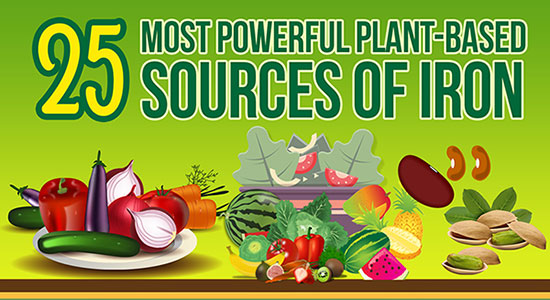
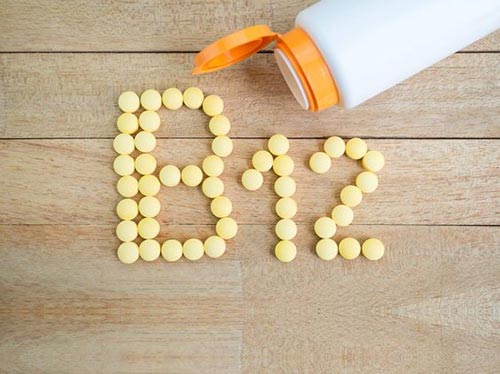
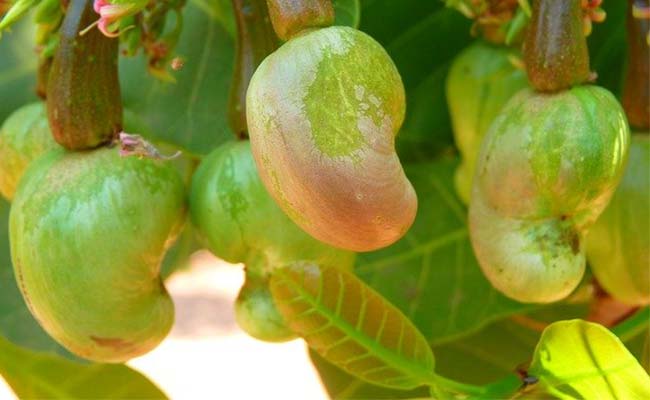
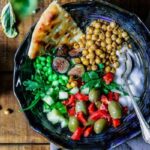
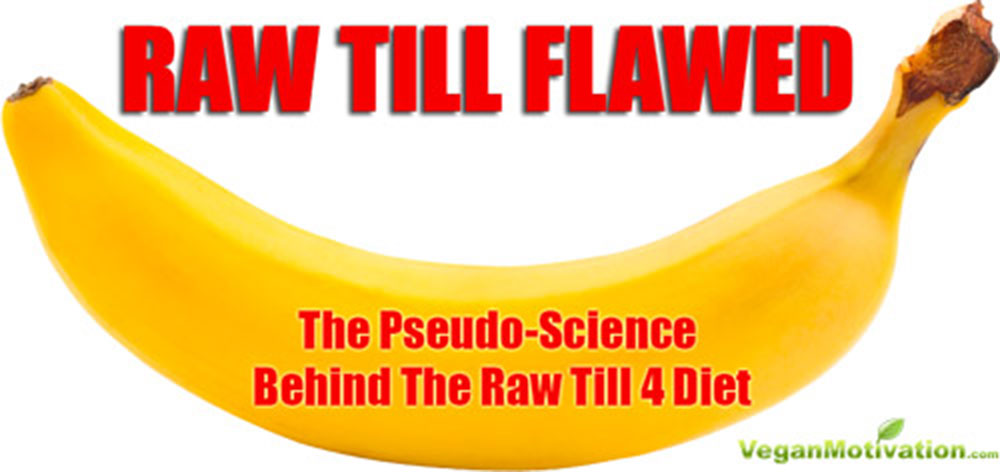
Peter firstly I love your work and find your articles well researched easy to understand and so interesting.
I currently suffer with menorrhagia (very heavy periods) and whilst I do try to eat as much iron as I can from foods and maintain my Hb around 120 my ferritin level is pretty low at 14.
Ferritin is really confusing me 😵💫 as there’s so much about iron but nothing ever mentions Ferritin.
Do you know if there is a difference in how I increase my ferritin level compared with iron and if as a Vegan there is a way for someone like myself suffering with menorrhagia to maintain levels?
Keep up the excellent work, you are amazing
Apr 06, 2024 at 8:40 am
Hi Lucy,
Thank you for your kind words.
Here’s how it works:
Ferritin is a protein that stores iron within cells and releases it when needed. It serves as a marker of the body’s iron storage levels.
Iron levels refer to the amount of iron present in the bloodstream.
Ferritin levels are often used as an indirect indicator of iron levels, with higher ferritin levels typically indicating higher iron stores, and lower levels suggesting iron deficiency.
Your Hb level is on the lower scale for an adult female but just in range. Your ferritin level correlates. You should increase this level. I recommend carrying on with all the iron-rich plant-based foods but also getting a lucky iron fish. Use it for a couple of months and then re-test your levels.
It was invented to address low iron levels in women. You can read the story here: https://luckyironlife.com/pages/lucky-iron-story The original one is a little pricey, but it lasts 5 years. There are some cheaper alternatives on Amazon – See here: https://amzn.to/4cMEOqU
I hope this helps!
Peter
Apr 08, 2024 at 10:26 am
Can you please include links to the studies referenced? I’m not seeing any citations to back up the claims in this article. Thanks!
Aug 26, 2017 at 3:36 pm
Hi Don, I’ve added links to the studies. Thanks for reminding me!
Sep 22, 2017 at 5:53 pm